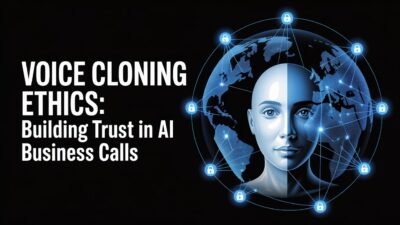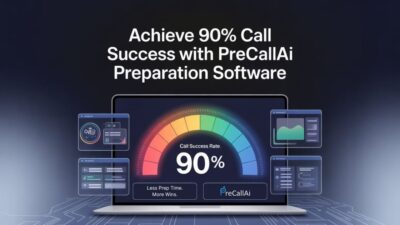HIPAA Compliance Requirements for AI Calling for Healthcare Practices
Implementing AI calling for healthcare practices requires absolute adherence to HIPAA regulations, which establish strict standards for protecting patient health information. Every aspect of AI calling systems must meet these requirements to avoid costly violations and maintain patient trust.
Table of Contents
Understanding HIPAA’s Application to AI Calling for Healthcare Practices
HIPAA’s Privacy Rule governs how protected health information can be used and disclosed during AI calling interactions. Healthcare providers must ensure that AI systems only access and share patient information for authorized purposes, such as treatment, payment, or healthcare operations.
The Security Rule establishes specific requirements for protecting electronic patient information. AI calling for healthcare practices must implement appropriate safeguards including encryption, access controls, and audit trails that protect patient data throughout the communication process.
Business Associate Agreements become crucial when working with third-party AI calling vendors. These agreements must clearly define how patient information will be protected and establish accountability for HIPAA compliance across all system components.
Technical Safeguards for Compliance: AI Calling for Healthcare Practices
Robust technical safeguards form the foundation of HIPAA-compliant AI calling systems. Data encryption must protect patient information during transmission between the AI system and healthcare facilities, as well as during storage in databases and servers.
Access controls ensure that only authorized personnel can configure or monitor AI calling systems. Multi-factor authentication, role-based permissions, and regular access reviews help maintain security while allowing appropriate system management.
Audit logging capabilities track all interactions with patient information, creating detailed records that can demonstrate compliance during regulatory reviews. These logs must capture who accessed what information, when access occurred, and what actions were taken.
Administrative and Physical Safeguards For AI Calling for Healthcare Practices
Administrative safeguards establish the policies and procedures necessary for compliant AI calling operations. Healthcare organizations must designate security officers responsible for overseeing AI calling compliance and ensure that all staff receive appropriate training on HIPAA requirements.
Incident response procedures must address potential security breaches or system failures that could compromise patient information. These procedures should include steps for containing breaches, notifying affected patients, and implementing corrective measures.
Physical safeguards protect the computer systems and equipment used for AI calling. This includes secure server locations, workstation security, and controls over device access that prevent unauthorized individuals from accessing patient information.
Practical Applications of AI Calling for Healthcare Practices
Healthcare providers are finding innovative ways to implement AI calling systems across various aspects of patient care and practice management. These applications demonstrate the versatility and value of AI calling technology in real-world healthcare settings.
Appointment Management and Scheduling
AI calling for healthcare practices excels at managing appointment-related communications. These systems can automatically confirm upcoming appointments, handle rescheduling requests, and send preparation reminders that include specific instructions for different types of visits.
The systems can also conduct intelligent scheduling by considering provider availability, patient preferences, and clinical requirements. When patients request appointments, AI systems can offer appropriate time slots while automatically checking insurance coverage and referral requirements.
Appointment reminder calls can be personalized based on the type of visit, patient history, and specific preparation needs. For example, the system might remind surgical patients about fasting requirements while providing different instructions for routine check-ups.
Patient Follow-Up and Care Coordination
Post-visit follow-up represents another valuable application of AI calling systems. These calls can assess how patients are feeling after treatment, check on medication adherence, and identify any concerning symptoms that might require clinical attention.
AI calling for healthcare practices can facilitate care coordination between multiple providers by sharing relevant information about treatment plans and patient progress. This coordination helps ensure continuity of care while reducing the risk of medical errors.
Chronic disease management becomes more effective with regular AI calling check-ins. The systems can monitor symptoms, medication compliance, and lifestyle factors that impact health outcomes, providing early warning signs that allow for proactive interventions.
Patient Education and Health Promotion
Educational outreach through AI calling systems can deliver personalized health information that supports patient wellness and preventive care. These calls can provide medication instructions, dietary guidance, and exercise recommendations tailored to individual patient needs.
Health screenings and risk assessments can be conducted through AI calling systems, helping identify patients who may benefit from additional clinical attention or preventive services. This proactive approach helps shift healthcare delivery from reactive treatment to preventive care.
Selecting the Right AI Calling Solution
Choosing appropriate AI calling for healthcare practices requires careful evaluation of multiple factors, including technical capabilities, compliance features, and long-term scalability. Healthcare providers must balance functionality with security while considering implementation complexity and ongoing costs.
Essential Features to Evaluate
Natural language processing capabilities determine how well AI systems can understand and respond to patient communications. Look for systems that can handle various accents, speech patterns, and conversational styles commonly encountered in your patient population.
Integration capabilities are crucial for seamless operation with existing healthcare systems. The AI calling platform should connect easily with electronic health records, practice management software, and other clinical systems to maintain comprehensive patient records.
Reporting and analytics features provide insights into communication effectiveness, patient satisfaction, and operational efficiency. These tools help healthcare providers continuously improve their AI calling programs and demonstrate value to stakeholders.
Vendor Evaluation Criteria
Healthcare industry experience is essential when selecting AI calling vendors. Providers with extensive healthcare backgrounds better understand regulatory requirements, clinical workflows, and patient communication preferences.
Security certifications provide important validation of vendor capabilities. Look for certifications such as SOC 2 Type II, HITRUST validation, and documented HIPAA compliance procedures that demonstrate a commitment to protecting patient information.
Technical support and implementation services significantly impact deployment success. Evaluate vendor capabilities for training, ongoing support, system maintenance, and continuous improvement to ensure long-term success.
Implementation Best Practices
Successful implementation of AI calling for healthcare practices requires comprehensive planning that addresses technical integration, staff training, patient communication, and compliance verification. Taking a systematic approach helps ensure smooth deployment and optimal results.
Planning and Preparation
Start with a thorough assessment of current communication processes and identify specific areas where AI calling can provide the greatest value. This assessment should include staff workflows, patient communication preferences, and existing technology infrastructure.
Develop clear objectives for AI calling implementation, including specific metrics for measuring success. These might include reduction in no-show rates, improvement in patient satisfaction scores, or decreased administrative costs.
Create a detailed implementation timeline that allows adequate time for system testing, staff training, and patient communication about new services. Rushing implementation often leads to problems that could have been avoided with proper planning.
Staff Training and Change Management
Comprehensive staff training ensures that team members understand how AI calling systems work and how to manage them effectively. Training should cover system operation, troubleshooting, and compliance requirements.
Change management strategies help address staff concerns about AI calling implementation. Clear communication about how these systems will enhance rather than replace human roles helps build support for the new technology.
Ongoing education keeps staff current with system capabilities and best practices. Regular training updates ensure that team members can maximize the benefits of AI calling for healthcare practices.
Future Trends and Considerations
The evolution of AI calling technology continues to accelerate, with emerging capabilities creating new opportunities for improving patient care and operational efficiency. Healthcare providers should consider these trends when planning their AI calling strategies.
Advanced natural language processing is making AI systems more conversational and intuitive, enabling more complex patient interactions and better understanding of patient needs. Integration with wearable devices and remote monitoring technologies is expanding AI calling capabilities to include real-time health data in patient communications.
Predictive analytics capabilities are enabling proactive patient outreach based on health risk assessments and care gaps. These capabilities help healthcare providers identify patients who may need additional attention before problems become serious.
Regulatory evolution continues to shape AI calling requirements, with new privacy regulations and healthcare compliance standards affecting system design and implementation. Healthcare providers must stay informed about these changes to maintain compliance.
Read More: Advanced AI Calling: Webhook Integration For Developers
Conclusion
AI calling for healthcare practices represents a transformative opportunity for healthcare providers to enhance patient care while improving operational efficiency and reducing costs. Success requires careful attention to HIPAA compliance, thoughtful vendor selection, comprehensive implementation planning, and ongoing optimization efforts.
Healthcare organizations adopting AI calling technology while focusing on patient privacy, care quality, and regulatory compliance will be best positioned to thrive in the evolving healthcare landscape. The key is approaching implementation systematically, ensuring that AI calling systems enhance rather than replace the personal connections fundamental to effective healthcare delivery.






[…] Read More: HIPAA Complaint AI Calling For Healthcare: Complete Guide […]
[…] Read More: HIPAA-Compliant AI Calling For Healthcare Practices […]